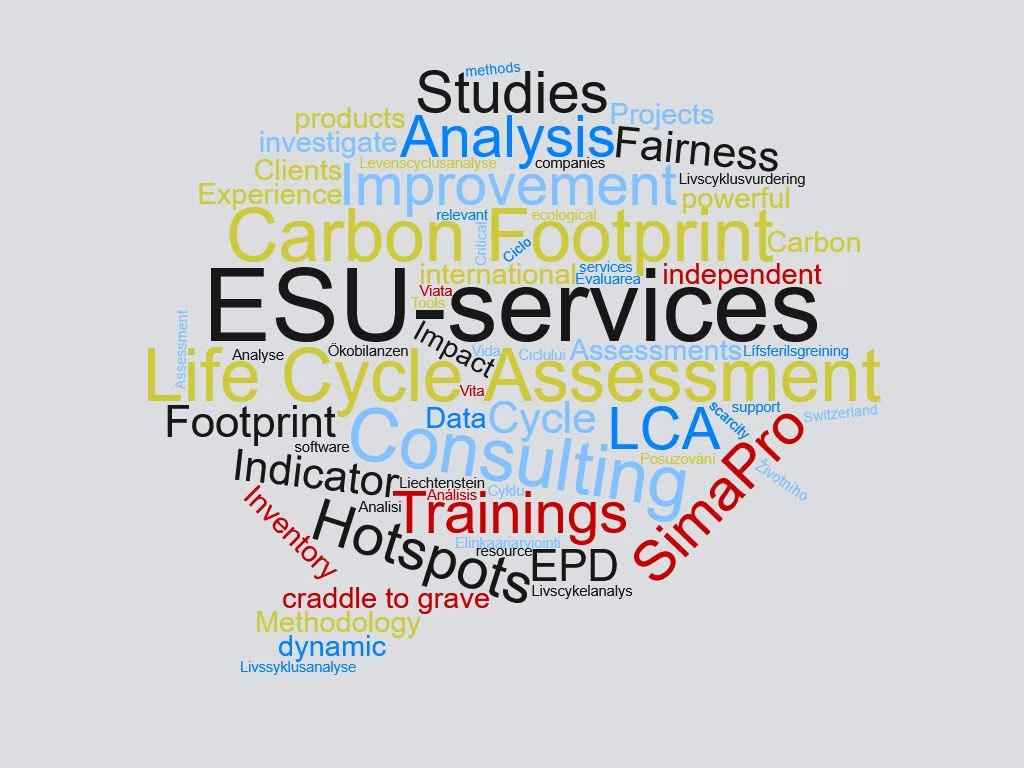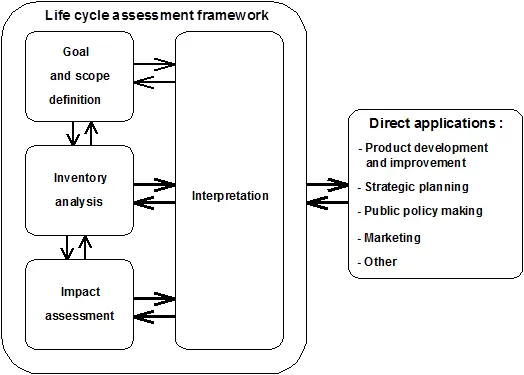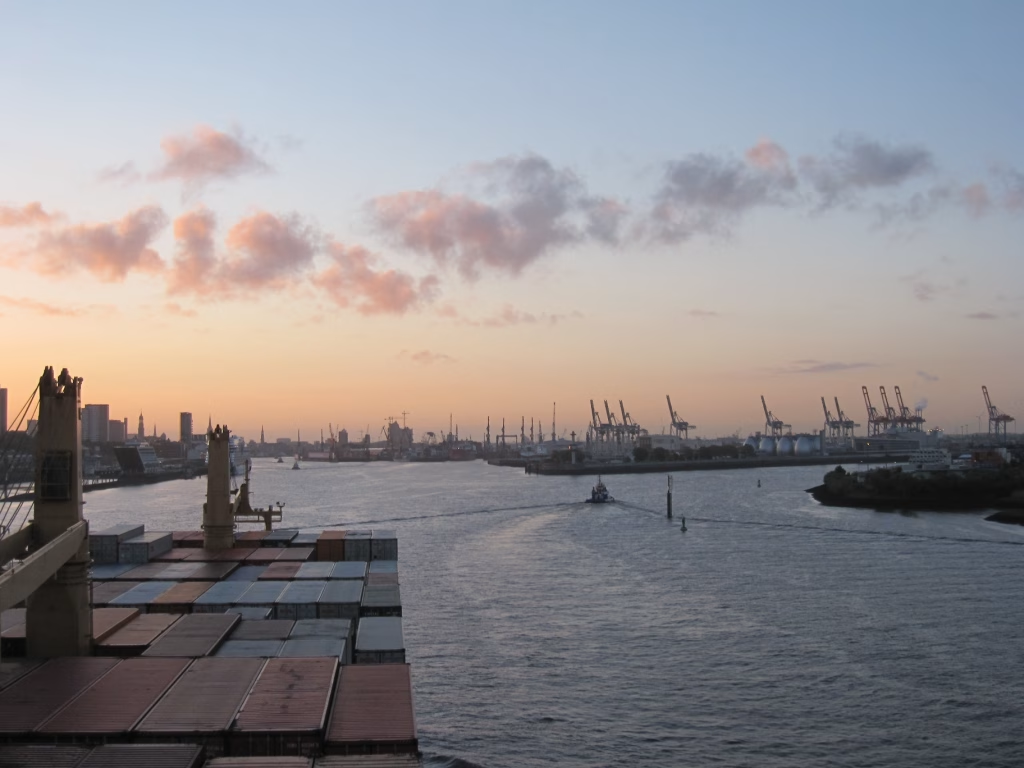Expert LCA Consulting: Analyze, Optimize, and Declare Your Product’s Environmental Impact
Since 1998, ESU-services has helped businesses worldwide to assess and reduce the environmental impact of their products and services using Life Cycle Assessment (LCA). The cradle-to-grave approach ensures you meet sustainability goals, comply with regulations, and gain a competitive edge.
LCA looks on the whole life cycle from cradle to grave. Hence, all environmental impacts are evaluated, from the resource extraction up to the disposal of the product. ESU applies the method to help our customers to

- understand and reduce the environmental impacts of their products
- analyse and optimize their products
- compare different products with each other
- declare the environmental impacts in EPD (environmental product declarations)
What You’ll Discover with Our LCA Consulting:
- Hotspot Analysis: Where are the biggest environmental impacts in your product’s life cycle?
- Reduction Opportunities: How can you cut carbon footprint and resource use?
- Product Comparisons: How does your product stack up against alternatives?
- Transparency: How to communicate your product’s environmental performance in EPDs or fact sheets.
Our LCA Packages
ESU-services offers three tailored Life Cycle Assessment packages, developed according to your specific requirements and objectives. From quick initial orientation to comprehensive scientific analysis, you’ll find the right solution with us.
Basic Life Cycle Assessment
For initial orientation and internal decision-making
Our basic package is ideal for companies that need an initial assessment of a product’s environmental impacts. This compact solution offers you:
- Quick initial orientation for internal management decisions
- One proven assessment method for total environmental impact and carbon footprint providing reliable decision-making foundations
- Compact results presentation as a short report or PowerPoint presentation
- Completion within 1-3 months
- Cost-effective solution with a guide price between CHF (EUR) 4,000 and 7,000
Note: This package is designed for internal purposes and is not suitable for publication.
Extended Life Cycle Assessment
For detailed analyses and process optimization
The extended life cycle assessment is the optimal choice for companies that want to make well-founded decisions and systematically improve their environmental performance:
- Detailed environmental assessment or Environmental Product Declaration with enhanced significance
- Comprehensive data collection including additional datasets
- Sound scientific foundation through literature research
- Complete evaluation of differen environmental indicators for a broader perspective
- Sensitivity analysis to validate results
- Comprehensive documentation with detailed report and extensive presentation
- Publication-ready quality for external communication or EPD creation
- Completion within 2-6 months
- Guide price: CHF (EUR) 7,000 to 15,000
Ideal for product and process optimization as well as for communicating the environmental impacts of your products.
Complete Life Cycle Assessment with Comparisons
The premium solution for the highest standards
For complex systems and demanding questions, we offer our comprehensive life cycle assessment – a completely customized solution:
Data Collection and Analysis
- Individual and automatized data collection full documentation and creation of specific datasets
- Parameterized life cycle assessment for optimal individual solutions
- Complete material flow analysis of your company or operation
- Provision of life cycle inventory data in SimaPro format for further use in LCA software
Scientific Excellence
- Recognized life cycle impact assessment (LCIA) method with complete coverage of environmental indicators for comprehensive perspectives
- Recognized weighting procedures for impact categories (climate, ozone depletion, eutrophication, acidification, etc.) for total environmental impact
- Sensitivity analysis and scenario calculations for robust results
- Monte Carlo simulation for uncertainty analysis
Communication and Trust Building
- Marketing support for PR materials and communication
- Critical review by independent experts for comparative statements to be published
- Publication-ready quality with scientific standards
- Comprehensive documentation with detailed report, life cycle inventory data in SimaPro format, and presentation
- Completion within 4-12 months
- Guide price: CHF (EUR) 15,000 to 25,000
Since these are very individual solutions, we are happy to create a customized offer based on your specific requirements.
Why Choose ESU-services for LCA Consulting?
All our packages are conducted by experienced experts and comply with current scientific standards.
- Compliance & Certification: Meet ISO 14040/44, EN 15804, and EPD requirements.
- Cost Savings: Identify hotspots to reduce resource use and waste.
- Market Advantage: Differentiate your product with verified environmental claims.
- Expertise: 25+ years of experience across industries (food, energy, packaging, etc.).
- Tailored Solutions: From quick screenings to full LCA reports.

Contact us for a non-binding consultation and find out which package best suits your objectives.
Get a Tailored LCA Offer in 3 Steps
We offer life cycle assessment consulting according to your questions and needs
1. Contact us providing information about:
- Product/service to analyze
- Goal (EPD, comparison, optimization, etc.)
- Preferred language for reports
- Contact details
2. We’ll review your needs and provide a proposal.
3. Start your project with our expert team.
The four stages of LCA consulting
The International Organization for Standardization (ISO) standardizes the general procedure of conducting an LCA in ISO 14040 and ISO 14044. An LCA consists of four stages:
- Goal and Scope Definition
- Inventory Analysis (LCI)
- Impact Assessment (LCIA)
- Interpretation
The stages of an LCA in detail
The Goal Definition (phase 1) covers the description of the object of investigation. In this phase, we define together the environmental aspects to be considered in the interpretation. The Scope Definition includes the way of modelling the object of investigation, the identification as well as the description of the processes of importance towards the object of investigation. Our consultants also help to define an appropriate functional unit, which determines the base for the comparison.
Then the project team inventories the direct environmental impacts (emissions and resource uses), the amount of semifinished products, auxiliary materials and energy of the processes involved in the life cycle in the Inventory Analysis (phase 2). This data is set in relation to the object of investigation, i.e. the functional unit. Afterwards, we calculate the cumulative resource demands and emissions of pollutants.
The Inventory Analysis provides the basis for the Impact Assessment (phase 3). Current impact assessment methods, such as environmental footprint, ecological scarcity or ReCiPe, are applied to the inventory results. We calculate than the indicator values that are used and referred to in the interpretation.
Our consultants analyse and comment the results of the inventory analysis and the impact assessment in the Interpretation (phase 4) according to the initially defined goal and scope of the LCA. Afterwards, we provide you the final conclusions and recommendations to answer the initial questions.

Data collection for Life Cycle Assessment

At the start of the project, we will discuss with you the data needs for the project. You will have to provide information on the amount and type of energy and materials used per reference unit (e.g. kg of product) for each life cycle stage, e.g.:
- Input of raw materials
- Electricity use from grid (classified by country)
- Heating energy (specified by energy carrier e.g. heating oil, natural gas, wood, charcoal, biogas, etc.)
- Water use (classified by country)
- Use of chemicals, metals, plastics, or other auxiliary materials e.g. detergents, solvents, minerals, rare earths, packages, metals, plastics, etc.
- Supply chains and transport of materials from previous stage to location where products are produced
- Losses of materials as waste or for recycling during processing
- Direct emissions to air
- Effluents / wastewater (classified by type of treatment and concentration of pollutants)
- Disposal of wastes (classified by type of material and treatment)
LCA studies authored by ESU
ESU-services investigates all types of products and services in LCA case studies. Some working examples are:
- Life cycle assessment of pets
- Comparison of energy systems
- Comparison of mineral water and tap water
- Comparison of different conversion processes for BTL-fuels (biomass-to-liquid)
- Energy analysis of beef from Argentina and LCA several other food products
- LCA of photovoltaics and other types of electricity production
- Carbon footprint of skiing, cruises and other types of holidays
The webpage section on publications shows a full list of LCA case studies published by ESU-services. Another section of this webpage provides a full list of projects and some information of working examples as elaborated in the last 25 years.
LCA methodology development
The influence of normalization and weighting on results by different possibilities given in the ISO Standard . Presented by Jungbluth, Niels during 72nd LCA Forum – Normalization and weighting: The forgotten theme in LCA